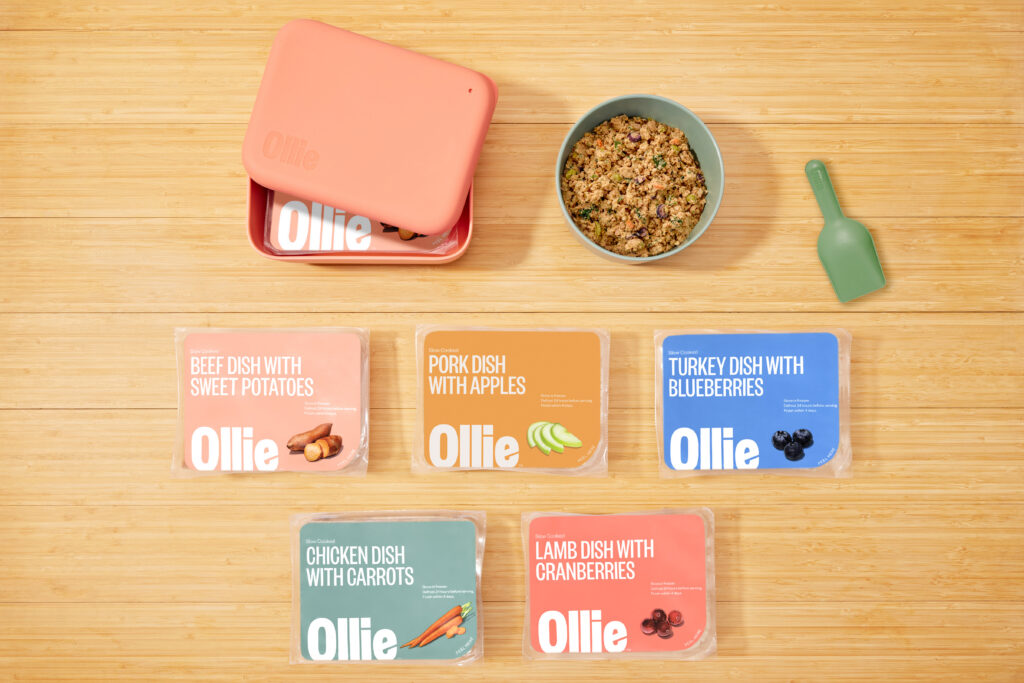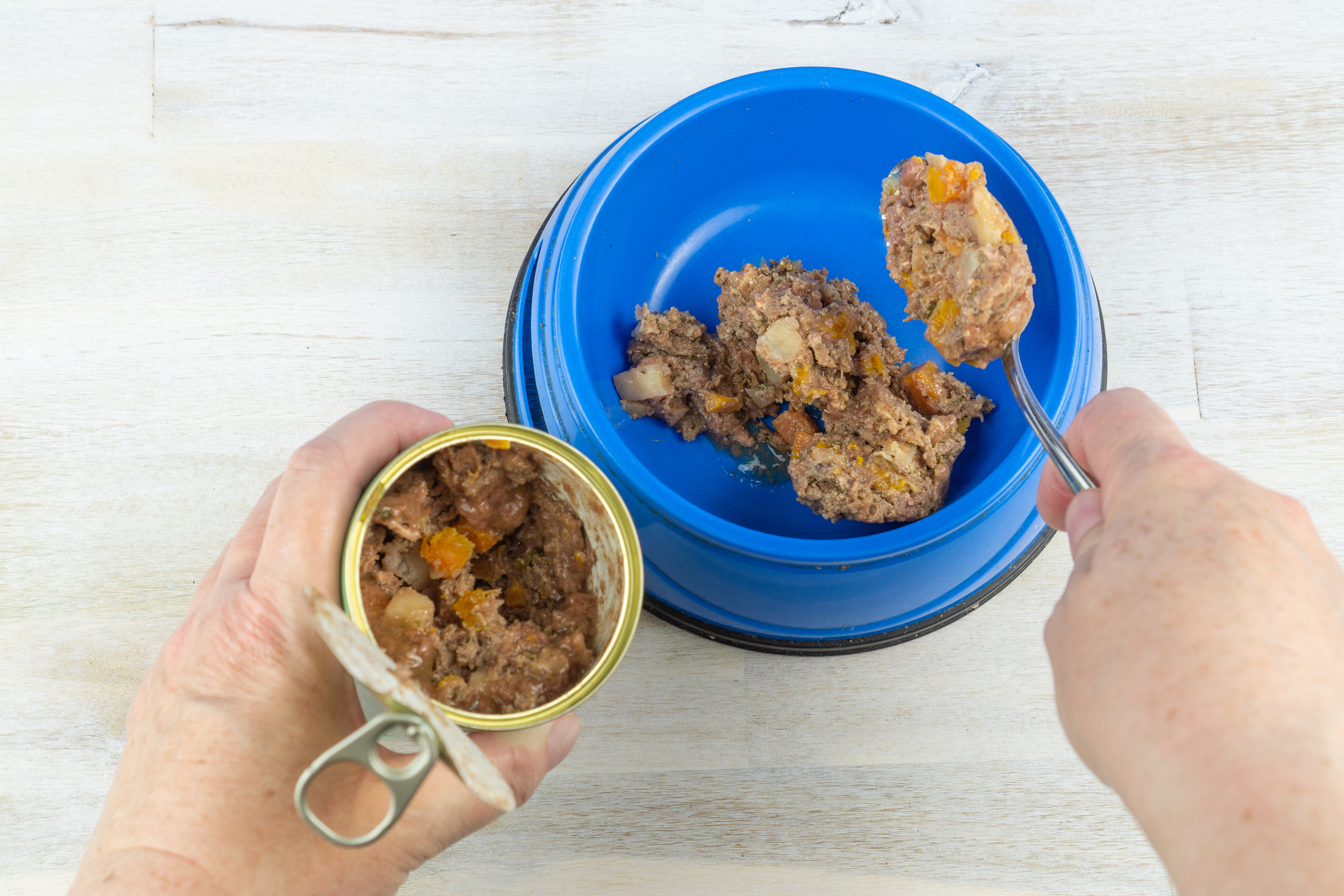Hey Ollie blog readers! We’re offering you an exclusive 60% OFF your starter box! Try now!
While canned dog food might seem like a convenient choice for your pup, it carries several hidden risks that could impact their health. Understanding these concerns will help you make better decisions about your dog’s nutrition and consider healthier alternatives.
1. Poor Ingredient Quality Despite Marketing Claims
Most wet foods still contain by-products and rendered meat, despite premium positioning. When you examine labels, you’ll often find potassium chloride, choline chloride, and other unpronounceable ingredients. Many brands include non-specific animal parts like liver or heart without identifying the source animal, plus artificial sweeteners that add no nutritional value to your dog’s diet.
2. Artificial Meat Chunks Aren’t Real Meat
Those appetizing meat chunks in your dog’s canned food often contain binding agents like wheat gluten or gum to create the appearance of natural meat pieces. These binders can cause digestive issues, including diarrhea, and pose particular problems if your dog has gluten sensitivities or allergies.
3. BPA Exposure from Can Linings
After eating canned dog food for two weeks as part of a biomedical study, dogs had higher levels of the controversial chemical bisphenol A (BPA) in their blood than when the research began [1]. University of Missouri researchers found that BPA increased nearly three-fold after being on the either of the two canned diets for two weeks [2].
BPA is an endocrine-disrupting chemical linked to health issues including increased blood pressure, neurological problems, and potentially cancer. The amount of BPA in pet dogs’ bodies nearly tripled when they switched from bagged dog food to canned dog food [3], raising serious concerns about long-term exposure.
4. Complex Processing Destroys Nutrients
Canned dog food manufacturing involves extensive high-heat processing that can destroy beneficial nutrients and enzymes. The process combines raw ingredients with thickeners and gels, then subjects everything to intensive cooking methods that compromise nutritional value.
Unlike traditional canned foods, fresh dog foods are gently cooked at lower temperatures. So, they avoid the damage to delicate vitamins and nutrients during processing [4].
5. Misleading Health Benefit Claims
While canned food is often recommended for dogs with kidney problems or dental issues due to moisture content, these benefits aren’t exclusive to canned products. Fresh, gently cooked meals provide the same hydration and ease of eating while offering superior nutritional quality without processing concerns.
Healthier Alternatives for Your Dog
Fresh Dog Food Options
Instead of relying on heavily processed canned food, consider fresh dog food delivery that offers:
- Human-grade ingredients you can recognize and pronounce
- Gentle cooking methods that preserve nutrients
- BPA-free packaging to eliminate chemical exposure
- Veterinary nutritionist assisted formulation for complete nutrition
High quality, human-grade ingredients that do not contain fillers, preservatives or additives [5] make fresh food a superior choice for your dog’s health.

Why Quality Matters
Fresh food companies claim the most important difference between their offering and highly-processed alternatives is its increased nutritional value and the signs of improved wellbeing you’ll see in your dog after they’ve been on the diet for a while [6].
Ready to give your dog better nutrition? Discover how Ollie’s fresh, human-grade meals can support your pup’s health without the risks associated with traditional canned food.
Frequently Asked Questions
Is fresh dog food really worth the extra cost?
Yes, because you’re paying for higher-quality ingredients, better processing methods, and avoiding potential health risks from BPA exposure and artificial additives found in many canned foods.
How can I tell if my dog is affected by poor-quality canned food?
Watch for digestive upset, changes in energy levels, or coat quality issues. These can be signs that your dog isn’t thriving on their current diet.
What should I look for when choosing healthier dog food?
Focus on whole, identifiable ingredients, minimal processing, and transparent sourcing. Avoid products with lengthy ingredient lists full of chemicals you can’t pronounce.
Citations
[2] https://www.sciencedaily.com/releases/2016/12/161219134416.htm
[4] https://www.dogfoodadvisor.com/best-dog-foods/fresh-dog-food/
[5] https://citizenshipper.com/blog/freshpet-vs-the-farmers-dog-two-fresh-dog-food-brands/
[6] https://www.dogfoodadvisor.com/canine-nutrition/fresh-dog-food-cost/
Tagged As:

The nutrition your dog needs,
the food they want.

Enjoying our articles? Subscribe our Newsletters and get new articles directly to your inbox
You might also like
18 August 2025
6 MINS READ
What Pet Parents Need to Know About Extruded Kibble
Not all dog food is created equal. When choosing a diet, it’s important to consider how the way your dog’s food is made impacts their overall health and nutrition. Understanding the manufacturin…
by Ollie Pets
18 August 2025
9 MINS READ
Nourish Skin from Within: Fresh Dog Diet Benefits
If your dog is constantly scratching, licking their paws, or has a dull, flaky coat, it’s not just frustrating—it could be a sign that something’s off in their diet. Skin and coat issues are som…
by Ollie Pets
18 August 2025
6 MINS READ
How Much To Feed Your Puppy: Easy Cups-to-Weight Chart
Puppies have rapidly changing nutritional needs as they develop from tiny bundles of energy into healthy, happy adult dogs. Growing puppies need more calories, fat, protein and essential nutrients…
by Ollie Pets







